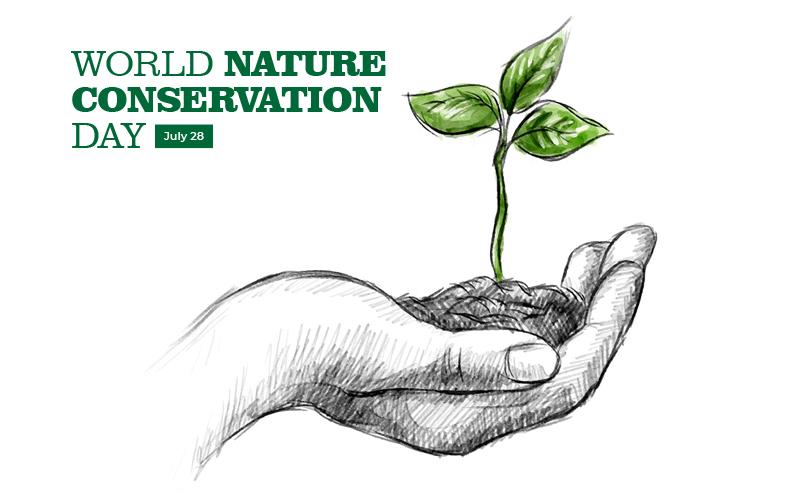Every year on July 28, people across the globe observe World Nature Conservation Day — a day dedicated to raising awareness about the urgent need to protect, conserve, and restore our natural environment. As climate change accelerates and biodiversity declines, this day serves as a powerful reminder that the Earth’s resources are not infinite, and our survival depends on how we treat the natural world.
Why Do We Celebrate World Nature Conservation Day?
Nature provides us with everything we need — clean air, safe drinking water, fertile soil, biodiversity, and a stable climate. But over the years, human activities like deforestation, pollution, mining, and overconsumption have pushed ecosystems to the brink.
World Nature Conservation Day aims to:
-
Promote awareness about the importance of conserving natural resources.
-
Encourage sustainable practices that reduce environmental harm.
-
Celebrate the planet’s rich biodiversity and the role it plays in our lives.
-
Inspire individual and collective action to protect Earth’s ecosystems.
It’s not just a day to reflect, but a day to act.
The Theme of World Nature Conservation Day 2025
(Note: If a theme is officially declared, you can insert it here. Otherwise, a relevant idea is)
“Harmony with Nature: Protect, Restore, Sustain” — focusing on building a future where human development coexists with ecological balance.
Why Nature Conservation Matters
Conservation is not only about protecting wildlife or planting trees — it’s about securing the very foundation of human well-being. Here's why it matters:
1. Biodiversity Support
Plants, animals, and microorganisms form a delicate web of life. Every species — from the tiniest insect to the largest whale — plays a role in maintaining balance in ecosystems.
2. Climate Regulation
Forests, oceans, and wetlands act as carbon sinks, absorbing CO₂ and cooling the planet. Destroying them accelerates global warming.
3. Clean Air and Water
Trees filter air pollutants. Wetlands purify water. Mountains store glaciers. All of nature’s services are vital for health.
4. Soil Health and Agriculture
Pollinators, earthworms, and microbes help grow our food. Conserving their habitats ensures food security.
5. Cultural and Spiritual Value
Many communities, especially indigenous tribes, have deep spiritual and cultural connections with nature.
Major Environmental Challenges We Face Today
Despite awareness, nature faces immense threats:
-
Deforestation – Millions of hectares are cleared each year for timber, farming, and urban growth.
-
Pollution – Air, water, and land pollution harm wildlife and human health.
-
Plastic Waste – Oceans are filling with plastic, affecting marine life.
-
Climate Change – Rising temperatures and sea levels threaten ecosystems and livelihoods.
-
Extinction Crisis – Thousands of species are going extinct faster than ever before.
How to Contribute to Nature Conservation
Every individual can play a role. Here are simple, yet impactful steps:
1. Plant More Trees
Trees absorb carbon dioxide, reduce erosion, and provide shelter for wildlife.
2. Reduce, Reuse, Recycle
Minimize waste and use eco-friendly materials to reduce pollution and landfill burden.
3. Avoid Single-Use Plastic
Carry cloth bags, metal straws, and reusable bottles to reduce ocean plastic pollution.
4. Save Water and Energy
Turn off taps, fix leaks, use LED bulbs, and conserve electricity to reduce your ecological footprint.
5. Support Conservation Groups
Donate to or volunteer with wildlife and forest protection organizations.
6. Practice Sustainable Living
Eat local and seasonal foods, reduce meat consumption, and use public transport.
7. Educate and Spread Awareness
Use social media, school activities, and art to spread messages of conservation.
World Nature Conservation Day in Schools and Communities
Celebrating this day in schools and communities helps inspire young minds and local action. Some ideas include:
-
Tree plantation drives
-
Nature-themed art and essay competitions
-
Clean-up campaigns in parks or rivers
-
Documentary screenings and debates
-
Eco-craft workshops using recycled materials
-
Pledges and awareness rallies
Such activities encourage environmental responsibility and a stronger bond with nature.
Global Efforts Toward Nature Conservation
Many international treaties and programs are working toward preserving nature, such as:
-
The Paris Agreement – A global pact to fight climate change.
-
UN Decade on Ecosystem Restoration (2021–2030) – A call to revive damaged ecosystems.
-
CITES (Convention on International Trade in Endangered Species) – Protects wildlife from exploitation.
-
Biosphere Reserves and National Parks – Provide safe havens for biodiversity.
Governments, NGOs, scientists, and citizens must work together to make these efforts successful.
Conclusion: Protect Nature to Protect Ourselves
World Nature Conservation Day is not just about celebrating nature — it is a wake-up call. The Earth is not ours to exploit but to cherish and protect. If we take care of nature, nature will take care of us.
Let’s shift from destruction to regeneration, from waste to wisdom, from ignorance to awareness.
Because we don’t need to do everything — we just need to do something. And do it now. For nature, for the future. 🌿🌏

